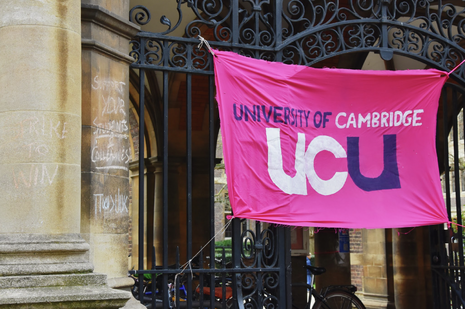Maybe the MAB hasn’t been all that bad
A pause in grades has allowed us to reflect on how we measure learning and success, argues Izzy Benardout

Every five days or so, like a strange offering to some kind of Marking and Assessment deity, I log onto CamSIS just in case my exam results have been uploaded. Of course it’s futile, but I feel as if I have some kind of unwritten, unspoken obligation to do so.
I know that the strike mandate only runs out on September 30th and have heeded my Director of Studies’ ambiguous and flippant notion of “the first half of Michaelmas”. Yet, perhaps following the same logic of checking whether you’re still on delivered when you know that you are, or tracking a parcel still in its warehouse, there is something comforting in the ‘just in case’.
“I’ve found myself less inclined to internalise both success and failure”
I won’t seek either to vindicate or condemn the Marking and Assessment Boycott (MAB) due to the complexity of the issue and the simple fact that there are people far better qualified to do so than me. But it would be a sheer denial of the facts to suggest that the strike hasn’t wreaked an unusual kind of chaos across exam season. Empty degree certificates, photo-op ceremonies and missed opportunities have been rife because of the strike – mainly affecting a cohort of students whose education has already been continuously disrupted. Many people have likened the education system to a series of stepping stones, and in this instance, one of the most important (and expensive) stones has been wrenched from the river, forcing students to wade the murky waters alone.
However, for the majority of continuing students, such as myself, the MAB (so far) has had no material consequences – and thus it is the immaterial consequences that are of great interest to me.
My first year has been remarkably numberless, with my supervisors holding a firm line against giving marks or classes for supervision essays, favouring written criticisms and question marks scrawled in red ink. Other than a ceremonial mock exam at the beginning of Easter, I have generally relied upon the comments and facial expressions of my supervisors to gauge how well I am doing.
“The experience of feedback in Cambridge is deeply varied and, in some cases, random”
At first, this was a culture shock. I can now admit that the experience of A-Levels had turned me into a Pavlov’s Dog-esque 20-marker machine, drooling at the sight of any mark above 80%. The absence of a formula for success and my forced abandonment of the PEEL structure was unnerving at first – but if you love something, you should let it go.
In a moment of lucidity during my first essay supervision I asked my supervisor: “How am I supposed to know if I’m where I’m meant to be?’”. Without numerical justification, how could I possibly know I was doing well, or doing enough? Words were intangible, but statistics were undeniable. Floating through the ether of ‘argument’ was not enough. He refused to humour me, urging me instead to break free of the matrices of the British education system and consider success differently. Clinging on to any iota of advice, I begrudgingly did so.
“The MAB has raised an opportunity to discuss how we measure success and achievement”
Now, nearly a year on, I still treasure that advice. Before university, I obsessed over numbers or the stars next to letters; I used percentages and letter grades as a lens through which to view myself. Without this, I have been accidentally freed from my self-inflicted pigeonholing. As I’m sure to which many will relate, praise is not in abundance in Cambridge, yet I’ve found myself less inclined to internalise both success and failure, which I think is a net positive.
I know this is not the case for everyone, and I am by no means attempting to preach a kind of ‘high-mindedness’ that will cure the ills of the Marking and Assessment Boycott or the general machinations of ‘academic rigour’. Having interrogated my friends on the subject, it is clear that the experience of feedback in Cambridge is deeply varied and, in some cases, random. Some have received a consistent stream of both comments and marks throughout the year, and thus the absence of marks because of the strike is stressful and alienating. Others, like me, have received no numerical feedback, and nonetheless resent this method. While one friend highlighted the merits of only receiving written feedback, another responded with “I hate that with a passion”. Regardless of individual take, the myriad of reactions makes clear that the MAB has raised an opportunity to discuss how we measure success and achievement – especially in the subjects where the notion of ‘no-right-answer’ reigns.
Now, I would be being self-indulgent to suggest that I won’t leap to my laptop when results get published. Of course, I am curious to see how an anonymous examiner viewed my mediocre take on Marx or if they could read my increasingly dodgy exam handwriting. Furthermore, I cannot deny the spectre of failing Tripos altogether, floating into my periphery like tumbleweed at semi-regular intervals. Yet for now, I have placed those intrusive thoughts into a box with other irrationalities to be dealt with another time and will wait patiently for my results, enjoying the rest of my summer in a gradeless abyss.
 News / Cambridge students set up encampment calling for Israel divestment6 May 2024
News / Cambridge students set up encampment calling for Israel divestment6 May 2024 News / Cambridge postgrad re-elected as City councillor4 May 2024
News / Cambridge postgrad re-elected as City councillor4 May 2024 News / Proposed changes to Cambridge exam resits remain stricter than most7 May 2024
News / Proposed changes to Cambridge exam resits remain stricter than most7 May 2024 News / Some supervisors’ effective pay rate £3 below living wage, new report finds5 May 2024
News / Some supervisors’ effective pay rate £3 below living wage, new report finds5 May 2024 Fashion / Class and closeted identities: how do fits fit into our cultures?6 May 2024
Fashion / Class and closeted identities: how do fits fit into our cultures?6 May 2024





